12 start with E start with E
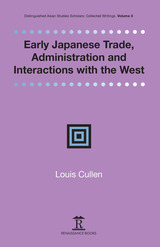

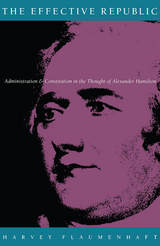
Although Hamilton exterted an extraordinary influence on American institutions, his contribution and the thinking behind it often have been obscured and misconstrued by piecemeal approaches to his voluminous writings. Here, Flaumenhaft draws upon more than two dozen volumes of Hamilton’s papers to produce a comprehensive account of his thought on the principles of politics—the account which Hamilton himself hoped to give in a multivolume treatise, but died before producing.
Beginning with a discussion of the place of general principles in Hamilton’s thought, The Effective Republic proceeds to his views on popular representation as a safeguard of individual liberty. Flaumenhaft then elaborates on Hamilton’s thinking about efficacious administration, especially how the President and Senate meet the requirements of unity and duration in a republic, and on the importance of an independent judiciary for constitutional integrity. What emerges clearly as Hamilton’s chief concern is the need to make government not only safe but effective—hindered from doing harm by its popular base, but also, through the differentiation of administrative powers and tasks, capable of doing good.
Interpreting, linking, and, and arranging Hamilton’s words, Flaumenhaft allows Hamilton to speak for himself, to explain his benificiaries his vision of what the republican experiment needed in order to succeed.

. . . An engaging personal account of a public service career n the period leading to the 1974 revolution. It ...persuades and provides real insight into the genuine noblesse oblige of the first generation of technocrats drawn from the social elite of the post- war period.
-James McCann, Boston University
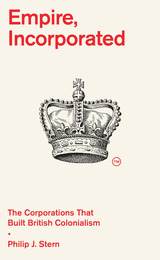
“A landmark book…[a] bold reframing of the history of the British Empire.”
—Caroline Elkins, Foreign Affairs
An award-winning historian places the corporation—more than the Crown—at the heart of British colonialism, arguing that companies built and governed global empire, raising questions about public and private power that were just as troubling four hundred years ago as they are today.
Across four centuries, from Ireland to India, the Americas to Africa and Australia, British colonialism was above all the business of corporations. Corporations conceived, promoted, financed, and governed overseas expansion, making claims over territory and peoples while ensuring that British and colonial society were invested, quite literally, in their ventures. Colonial companies were also relentlessly controversial, frequently in debt, and prone to failure. The corporation was well-suited to overseas expansion not because it was an inevitable juggernaut but because, like empire itself, it was an elusive contradiction: public and private; person and society; subordinate and autonomous; centralized and diffuse; immortal and precarious; national and cosmopolitan—a legal fiction with very real power.
Breaking from traditional histories in which corporations take a supporting role by doing the dirty work of sovereign states in exchange for commercial monopolies, Philip Stern argues that corporations took the lead in global expansion and administration. Whether in sixteenth-century Ireland and North America or the Falklands in the early 1980s, corporations were key players. And, as Empire, Incorporated makes clear, venture colonialism did not cease with the end of empire. Its legacies continue to raise questions about corporate power that are just as relevant today as they were 400 years ago.
Challenging conventional wisdom about where power is held on a global scale, Stern complicates the supposedly firm distinction between private enterprise and the state, offering a new history of the British Empire, as well as a new history of the corporation.
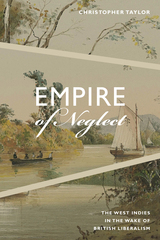
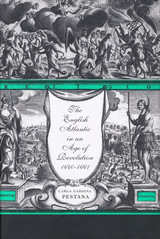
Between 1640 and 1660, England, Scotland, and Ireland faced civil war, invasion, religious radicalism, parliamentary rule, and the restoration of the monarchy. Carla Gardina Pestana offers a sweeping history that systematically connects these cataclysmic events and the development of the infant plantations from Newfoundland to Surinam.
By 1660, the English Atlantic emerged as religiously polarized, economically interconnected, socially exploitative, and ideologically anxious about its liberties. War increased both the proportion of unfree laborers and ethnic diversity in the settlements. Neglected by London, the colonies quickly developed trade networks, especially from seafaring New England, and entered the slave trade. Barbadian planters in particular moved decisively toward slavery as their premier labor system, leading the way toward its adoption elsewhere. When by the 1650s the governing authorities tried to impose their vision of an integrated empire, the colonists claimed the rights of "freeborn English men," making a bid for liberties that had enormous implications for the rise in both involuntary servitude and slavery. Changes at home politicized religion in the Atlantic world and introduced witchcraft prosecutions.
Pestana presents a compelling case for rethinking our assumptions about empire and colonialism and offers an invaluable look at the creation of the English Atlantic world.
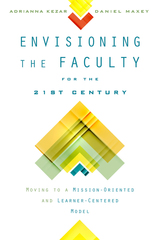
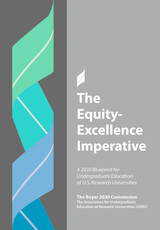
In 2021, The Association for Undergraduate Education at Research Universities (UERU)—with over 100 research university members and hosted at Colorado State University since 2013—recruited The Boyer 2030 Commission. This group was co-chaired by AAU’s Barbara R. Snyder and APLU’s Peter McPherson and included 14 additional distinguished higher ed leaders. The Boyer 2030 Commission sought to update the1998 Boyer Report, the landmark publication that inspired UERU’s founding in 2000 and helped spur nearly a quarter century of progress. Upon a year of research and reflection, the Boyer 2030 Commission issued The Equity/Excellence Imperative: A Blueprint for Undergraduate Education at U.S. Research Universities, reiterating the vital importance of undergraduate education at research universities and the need to invest in meeting what they name as the equity/excellence imperative.
From the Report:
"Research university presidents/chancellors, provosts, and their senior colleagues are today called upon to lead in a challenging world of deeply entrenched inequities laid bare by a deadly pandemic; a long-overdue racial reckoning; fractured democratic institutions and frayed democratic norms; an existential planetary climate emergency; a mental health crisis affecting all ages, including and especially traditional-aged undergraduate students; and growing public disaffection with and distrust of higher education. College-going and the prestige of a college degree are in decline, and, despite efforts to recruit and retain low-income undergraduate students, new data show that research universities were serving even fewer of them prior to the pandemic, let alone as a result. The Boyer 2030 Commission Report is organized around what the Commission has termed the ‘equity/excellence imperative,’ a belief that excellence and equity are inextricably entwined, such that excellence without equity (privilege reproducing privilege) is not true excellence, and equity (mere access) without excellence is unfulfilled promise. At this pivotal moment, the Boyer 2030 Commission poses these fundamental questions:
- How can US research universities embrace the equity/excellence imperative?
- Can we commit to equity as a necessary and defining precondition of excellence?
- Can we conceive, prioritize, and invest in equitable undergraduate achievement?
- Can we educate and support undergraduates for 21st-century world readiness?
Meeting the equity/excellence imperative offers a leadership opportunity. Recognizing that diversity of mission, identity, organization, and culture is a long-standing strength of U.S. higher education, the Boyer 2030 Commission offers 11 provocations to catalyze the multiple actions needed for a research university to realize the equity/excellence imperative. This report will aid leaders as they work to meet this imperative, and millions of undergraduate students, their alma maters and broader human society will meaningfully and measurably benefit as a result."
This book is also available as an open access ebook through the UERU.
Co-Chairs: Barbara R. Snyder, President, AAU and Peter McPherson, President Emeritus, APLU Commission
Members: Michael Crow, President, Arizona State University; Andrew Delbanco, President, Teagle Foundation; Roger Ferguson, former President, TIAA-CREF; Kathleen Fitzpatrick, Director of Digital Humanities, Michigan State University; Kevin Kruger, President and CEO, NASPA–Student Affairs Administrators in Higher Education; Gary May, Chancellor, University of California, Davis; Sarah Newman, Director of Art and Education at metaLAB, Harvard University; Lynn Pasquerella, President, American Association of Colleges & Universities; Deborah Santiago, Co-Founder and CEO, Excelencia in Education; Claude Steele, Lucie Stern Professor in the Social Sciences, Emeritus, Stanford University; Holden Thorp, Editor-in-Chief, Science; Eric Waldo, Founding Executive Director of Michelle Obama’s Reach Higher; Mary Wright, Associate Provost for Teaching and Learning, Brown University; Ex officio: Elizabeth Loizeaux, Boston University; Former President, UERU
Staff: Liz Bennett, Associate Director, UERU; Steven Dandaneau, Executive Director, UERU; Howard Gobstein, Senior Vice President, APLU; Ken Goldstein, Senior Vice President, AAU; Tara King, Education Program and Evaluation Manager, AAU; Emily Miller, Deputy Vice President, AAU; Mariah Pursley, Senior Coordinator, UERU; Kacy Redd, Associate Vice President, APLU; Liz Wasden, Research Assistant, University of Maryland, College Park

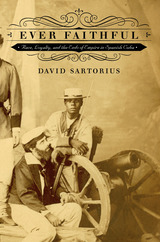

READERS
Browse our collection.
PUBLISHERS
See BiblioVault's publisher services.
STUDENT SERVICES
Files for college accessibility offices.
UChicago Accessibility Resources
home | accessibility | search | about | contact us
BiblioVault ® 2001 - 2024
The University of Chicago Press









